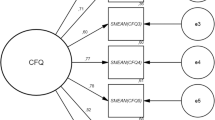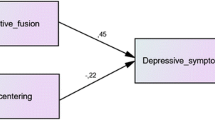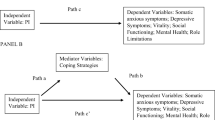Abstract
According to the experiential avoidance and psychological inflexibility model proposed by Acceptance and Commitment Therapy, cognitive fusion is a core component of psychological disorders and mental health. Also, previous theorizations proposed that cognitive fusion may be independent of diagnosis, which means that it may also be present in the non-clinical population. However, evidence for this assumption is still sparse. Therefore, this study aimed to explore the relationships between cognitive fusion, symptomatology and psychological well-being in a non-clinical sample. The total sample consisted of 224 subjects (Mage = 30.6, SD = 11.5). Participants completed self-report questionnaires in a cross-sectional design. Results show medium to strong positive correlations between cognitive fusion and symptomatology and negative correlations between cognitive fusion and well-being. Furthermore, cognitive fusion was a significant mediator of the relationship between psychological well-being and symptomatology. Our results support the assumption that cognitive fusion, as a component of psychological inflexibility, may be a core transdiagnostic variable in mental health.

Similar content being viewed by others
References
Andersen, P., Toner, P., Bland, M., & McMillan, D. (2016). Effectiveness of Transdiagnostic Cognitive Behaviour Therapy for Anxiety and Depression in Adults: A Systematic Review and Meta-analysis. Journal of Behavioural and Cognitive Psychotherapy, 44(6), 673–690. https://doi.org/10.1017/S1352465816000229.
Bardeen, J. R., & Fergus, T. A. (2016). The interactive effect of cognitive fusion and experiential avoidance on anxiety, depression, stress and posttraumatic stress symptoms. Journal of Contextual Behavioral Science, 5(1), 1–6. https://doi.org/10.1016/j.jcbs.2016.02.002.
Barlow, D. H., & Farchione, T. J. (Eds.). (2017). Applications of the unified protocol for Transdiagnostic treatment of emotional disorders. Oxford University Press.
Barlow, D. H., Farchione, T. J., Bullis, J. R., Gallagher, M. W., Latin, H., Sauer-Zavala, S., et al. (2017). Equivalence evaluation of the unified protocol for Transdiagnostic treatment of emotional disorders compared to diagnosis-specific CBT for anxiety disorders. JAMA Psychiatry, 74(9), 875–884.
Canavarro, M. C. (1999). Inventário de sintomas psicopatológicos – BSI. In M. R. Simões, M. Gonçalves, & L. S. Almeida (Eds.), Testes e provas psicológicas em Portugal (pp. 87–109). APPORT/SHO.
Cookson, C., Luzon, O., Newland J., & Kingston. J. (2019). Examining the role of cognitive fusion and experiential avoidance in predicting anxiety and depression. Journal of Psychology and Psychotherapy: Theory, Research and Practice. doi: https://doi.org/10.1111/papt.12233
David, A. S. (2010). Why we need more debate on whether psychotic symptoms lie on a continuum with normality. Psychological Medicine, 40:1935–1942. Doi:
Derogatis, L. R. (1993). The brief symptom inventory (BSI): Administration, scoring and procedures manual. National Computer Systems.
Dinis, A., Carvalho, S., Gouveia, J. P., & Estanqueiro, C. (2015). Shame memories and depression symptoms: The role of cognitive fusion and experiential avoidance. International Journal of Psychology and Psychological Therapy, 15(1), 63–86. https://doi.org/10.1177/014544551139834.
Duarte-Silva, M. E., & Novo, R. F. (2002). Inventário de Saúde Mental: Versão portuguesa do MHI. Lisboa: Faculdade de Psicologia e de Ciências da Educação (Documento não publicado).
Faustino, B. (2021). Transdiagnostic perspective on psychological inflexibility and emotional dysregulation. Behavioural and Cognitive Psychotherapy, 49(2), 233–246. https://doi.org/10.1017/S1352465820000600.
Faustino, B., & Vasco, A. B. (2020a). Schematic functioning, interpersonal dysfunctional cycles and cognitive fusion in the complementary paradigmatic perspective: analysis of a clinical sample. Journal of Contemporary Psychotherapy, I, 47–55. https://doi.org/10.1007/s10879-019-09422-x.
Faustino, B., & Vasco, A. B. (2020b). Early maladaptive schemas and cognitive fusion on the regulation of psychological needs. Journal of Contemporary Psychotherapy, 1, 105–112. https://doi.org/10.1007/s10879-019-09446-3.
Faustino, B., Vasco, A. B., Oliveira, J., Lopes, P., & Fonseca, I. (2019). Metacognitive Self-assessment Scale: psychometric properties and clinical applications. Applied Neuropsychology: Adult. https://doi.org/10.1080/23279095.2019.1671843.
Ferreira, C., Palmeira, L., & Trindade, I. A. (2014). Turning eating psychopathology risk factors into action. The pervasive effect of body image-related cognitive fusion. Appetite, 80, 137–142.
Figueira, M. L., Sampaio, D., & Afonso, P. (2014). Manual de Psiquiatria Clínica. Lidel.
Garland, E. L., & Howard, M. O. (2014). A Transdiagnostic perspective on cognitive, affective, and neurobiological processes underlying human suffering. Research on Social Work Practice, 24(1), 142–151. https://doi.org/10.1177/1049731513503.
Gillanders, D. T., Bolderston, H., Bond, F. W., Dempster, M., Flaxman, P. E., Campbell, L., Kerr, S., Tansey, L., Noel, P., Ferenbach, C., Masley, S., Roach, L., Lloyd, J., May, L., Clarke, S., & Remington, B. (2014). The development and initial validation of the cognitive fusion questionnaire. Behavior Therapy, 45(1), 83–101. https://doi.org/10.1016/j.beth.2013.09.001.
Gouveia, P., Dinis, A., Gregório, S., & Pinto, P. (2013). Questionário de Fusão Cognitiva: Versão Portuguesa. Unpublished manuscript. [Cognitive fusion questionnaire: Portuguese version]
Hayes, A. F. (2013). Mediation, moderation, and conditional process analysis. Introduction to Mediation, Moderation, and Conditional Process Analysis: A Regression-Based Approach. Edn. New York: Guilford publications, 1-20.
Hayes, S. C., Strosahl, K. D., & Wilson, K. G. (2011). Acceptance and commitment therapy: The process and practice of mindful change (2nd ed.). The Guilford Press.
Hayes, S. C., Pistorello, J., & Levin, M. E. (2012). Acceptance and commitment therapy as a unified model of behavior change. The Counseling Psychologist, 40(7), 976–1002. https://doi.org/10.1177/0011000012460836.
Hengartner, M. P., & Lehmann, S. (2017). Why psychiatric research must abandon traditional diagnostic classification and adopt a fully dimensional scope: Two solutions to a persistent problem. Frontiers in Psychiatry, 8, 101. https://doi.org/10.3389/fpsyt.2017.00101.
Hopwood, C. J., Kotov, R., Krueger, R. F., Watson, D., Widiger, T. A., Althoff, R. R., & Zimmermann, J. (2018). The time has come for dimensional personality disorder diagnosis. Personality and Mental Health, 12(1), 82–86. https://doi.org/10.1002/pmh.1408.
Kashdan, T. B., & Rottenberg, J. (2010). Psychological flexibility as a fundamental aspect of health. Clinical Psychology Review, 30(7), 865–878. https://doi.org/10.1016/j.cpr.2010.03.001.
Krafft, J., Haeger, J., & Levin, M. E. (2019). Comparing cognitive fusion and cognitive reappraisal as predictors of college student mental health. Cognitive Behaviour Therapy, 48, 241–252. https://doi.org/10.1080/16506073.2018.1513556.
Levin, M. E., MacLane, C., Daflos, S., Seeley, J. R., Hayes, S. C., Biglan, A., & Pistorello, J. (2014). Examining psychological inflexibility as a transdiagnostic process across psychological disorders. Journal of Contextual Behavioral Science, 3(3), 155–163. https://doi.org/10.1016/j.jcbs.2014.06.003.
Newby, J. M., McKinnon, A., Kuyken, W., Gilbody, S., & Dalgleish, T. (2015). Systematic review and meta-analysis of transdiagnostic psychological treatments for anxiety and depressive disorders in adulthood. Clinical Psychology Review, 40, 91–110. https://doi.org/10.1016/j.cpr.2015.06.002.
Reuman, L., Buchholz, J., & Abramowitz, J. S. (2018). Obsessive beliefs, experiential avoidance, and cognitive fusion as predictors of obsessive-compulsive disorder symptom dimensions. Journal of Contextual Behavior Science, 9, 15–20. https://doi.org/10.1016/j.jcbs.2018.06.001.
Ribeiro, J. L. P. (2001). Mental Health Inventory: Um estudo de adaptação à população portuguesa. Psicologia, Saúde & Doenças, 2(1), 77–99.
Rodriguez-Seijas, C., Eaton, N. R., & Krueger, R. F. (2015). How transdiagnostic factors of personality and psychopathology can inform clinical assessment and intervention. Journal of Personality Assessment, 97(5), 425–435. https://doi.org/10.1080/00223891.2015.1055752.
Segal, Z., Teasdale, J., & Williams, M. (2002). Mindfulness-based cognitive therapy for depression. Guilford Press.
Serafini, G., Gonda, X., Pompili, M., Rihmer, Z., Amore, M., & Engel-Yeger, B. (2016). The relationship between sensory processing patterns, alexithymia, traumatic childhood experiences, and quality of life among patients with unipolar and bipolar disorders. Child Abuse & Neglect, 62, 39–50. https://doi.org/10.1016/j.chiabu.2016.09.013.
Serafini, G., Canepa, G., Adavastro, G., Nebbia, J., Belvederi Murri, M., Erbuto, D., Pocai, B., Fiorillo, A., Pompili, M., Flouri, E., & Amore, M. (2017). The relationship between childhood maltreatment and non-suicidal self-injury: A systematic review. Frontiers in Psychiatry, 8, 149. https://doi.org/10.3389/fpsyt.2017.00149.
Solé, E., Tomé-Pires, C., de la Vega, R., Racine, M., Castarlenas, E., Jensen, M., & Miró, J. (2016). Cognitive fusion and pain experience in young people. The Clinical Journal of Pain, 32(7), 602–608. https://doi.org/10.1097/AJP.0000000000000227.
Tryon, W. W. (2016). Transtheoretical transdiagnostic psychotherapy. Journal of Psychotherapy Integration, 26, 273–287. https://doi.org/10.1037/a0040041.
Tyndall, I., Waldeck, D., Pancani, L., Whelan, R., Roche, B., & Pereira, A. (2018). Profiles of psychological Flexibility: A Latent Class Analysis of the Acceptance and Commitment Therapy Model. Behavior Modification. doi: https://doi.org/10.1177/0145445518820036
Vasco, A. B., Conceição, N., Silva, A. N., Ferreira, J. F., & Vaz-Velho, C. (2018). O (meta)modelo de complementaridade paradigmática (MCP). In I. Leal (ed.), Psicoterapias. Lisbon: Pactor. [Paradigmatic Complementarity Metamodel].
Ware, J. E., Johnston, S. A., Davies-Avery, A., & Brook, R, H. (1979). Conceptualization and measurement of health for adults in the health insurance study. Mental health, (3). Washington, D.C
Yee, C. M., Javitt, D. C., & Miller, G. A. (2015). Replacing DSM categorical analyses with dimensional analyses in psychiatry research: The research domain criteria initiative. JAMA Psychiatry, 72(12), 1159–1160. https://doi.org/10.1001/jamapsychiatry.2015.1900.
Author information
Authors and Affiliations
Corresponding author
Ethics declarations
The authors claim that there are no conflicts of interest.
Conflict of Interests
The author states that there is no conflict of interest.
Consent for Publication
Consent was given to Springer Nature.
Informed Consent
Informed consent was obtained by all individuals.
Data Sharing
Data is not available.
Ethics
This study was approved by ScientificCommittee of Faculty of Psychology of University of Lisbon.
Additional information
Publisher’s Note
Springer Nature remains neutral with regard to jurisdictional claims in published maps and institutional affiliations.
Rights and permissions
About this article
Cite this article
Faustino, B., Vasco, A.B., Farinha-Fernandes, A. et al. Psychological inflexibility as a transdiagnostic construct: relationships between cognitive fusion, psychological well-being and symptomatology. Curr Psychol 42, 6056–6061 (2023). https://doi.org/10.1007/s12144-021-01943-w
Accepted:
Published:
Issue Date:
DOI: https://doi.org/10.1007/s12144-021-01943-w




